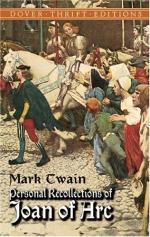[1] It remained there three hundred and sixty years, and then was destroyed in a public bonfire, together with two swords, a plumed cap, several suits of state apparel, and other relics of the Maid, by a mob in the time of the Revolution. Nothing which the hand of Joan of Arc is known to have touched now remains in existence except a few preciously guarded military and state papers which she signed, her pen being guided by a clerk or her secretary, Louis de Conte. A boulder exists from which she is known to have mounted her horse when she was once setting out upon a campaign. Up to a quarter of a century ago there was a single hair from her head still in existence. It was drawn through the wax of a seal attached to the parchment of a state document. It was surreptitiously snipped out, seal and all, by some vandal relic-hunter, and carried off. Doubtless it still exists, but only the thief knows where. — Translator.
3 Weaving the Net About Her
It was necessary for me to have some way to gain bread for Noel and myself; and when the Pierrons found that I knew how to write, the applied to their confessor in my behalf, and he got a place for me with a good priest named Manchon, who was to be the chief recorder in the Great Trial of Joan of Arc now approaching. It was a strange position for me—clerk to the recorder—and dangerous if my sympathies and the late employment should be found out. But there was not much danger. Manchon was at bottom friendly to Joan and would not betray me; and my name would not, for I had discarded my surname and retained only my given one, like a person of low degree.
I attended Manchon constantly straight along, out of January and into February, and was often in the citadel with him—in the very fortress where Joan was imprisoned, though not in the dungeon where she was confined, and so did not see her, of course.
Manchon told me everything that had been happening before my coming. Ever since the purchase of Joan, Cauchon had been busy packing his jury for the destruction of the Maid—weeks and weeks he had spent in this bad industry. The University of Paris had sent him a number of learned and able and trusty ecclesiastics of the stripe he wanted; and he had scraped together a clergyman of like stripe and great fame here and there and yonder, until he was able to construct a formidable court numbering half a hundred distinguished names. French names they were, but their interests and sympathies were English.
A great officer of the Inquisition was also sent from Paris for the accused must be tried by the forms of the Inquisition; but this was a brave and righteous man, and he said squarely that this court had no power to try the case, wherefore he refused to act; and the same honest talk was uttered by two or three others.




